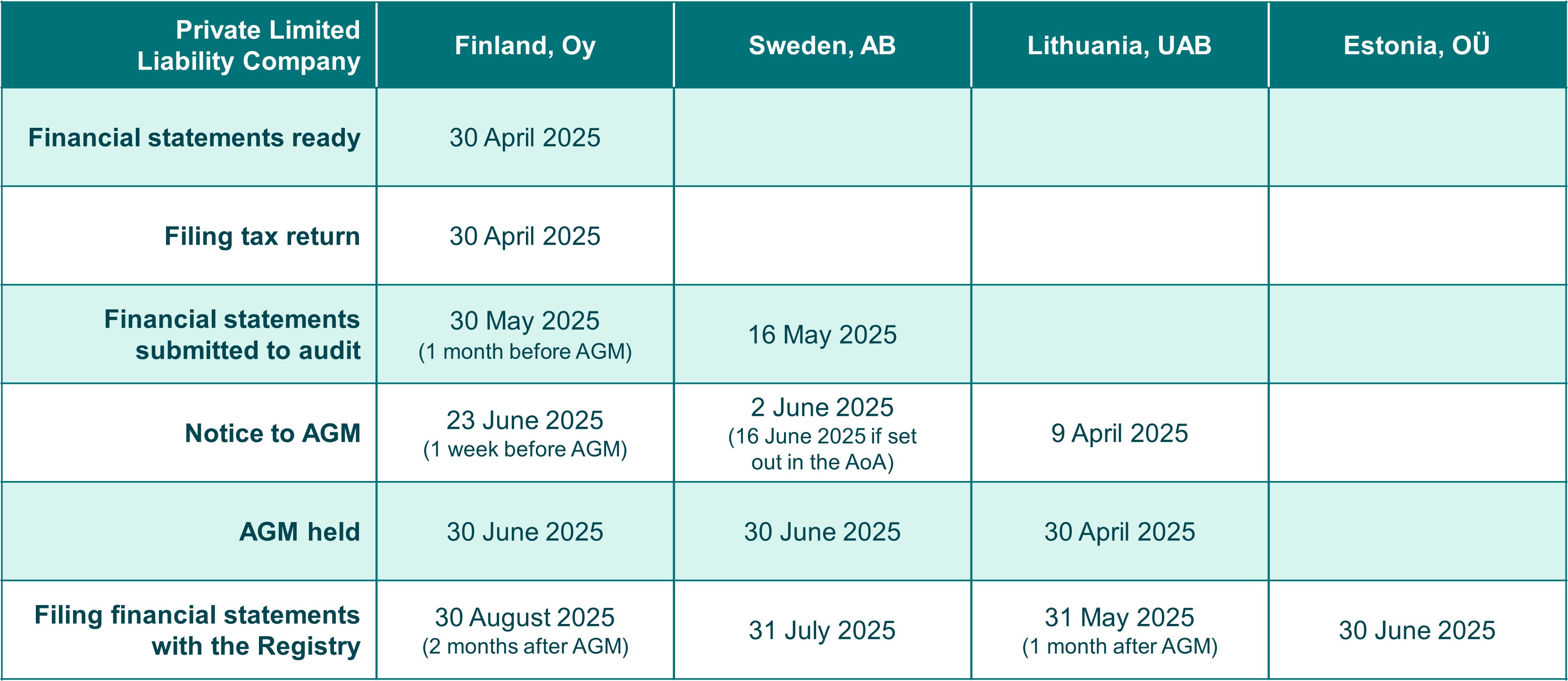Calendar for annual corporate governance matters

Managing yearly corporate governance requirements across multiple countries requires careful attention to different regulations in relation to the Financial Statements and the Annual General Meeting (AGM) in different countries. To streamline your planning, we have summarized the key obligations in all Fondia countries.
Major rules are similar, but deadlines differ
Below are the general rules for the most popular legal entity forms in Fondia countries. It is however essential to review also the articles of association of the companies, as they may stipulate different deadlines.
Finland (Oy - Private Limited Liability Companies):
Financial statements (FS) and annual report (AR): FS and AR prepared and tax returns filed no later than 4 months after the end of the financial period.
Submission to auditor: FS and AR submitted to the auditor, if the company is subject to audit, no later than 1 month before the Annual General Meeting (AGM).
Notice to AGM: Delivered no earlier than 2 months and no later than 1 week before the AGM; may be waived if all shareholders consent by a written unanimous shareholders’ resolution.
AGM held: No later than 6 months after the end of the financial year.
Filing with the Registry: FS and AR filed within 2 months after approval at AGM.
Sweden (AB - Private Limited Liability Companies):
Financial statements (FS) and annual report (AR): FS and AR prepared and, if the company is not subject to audit, must be ready not later than two weeks before the AGM.
Note: From the first financial year that begins after 1 July 2024, the FS and AR must include the date when they were concluded. This is a separate requirement from requirement to also include the date when the annual accounts were signed by the members of the board.Submission to auditor: FS and AR submitted to the auditor, if the company is subject to audit, not later than six weeks before the AGM.
Notice to AGM: Delivered no earlier than 6 weeks and no later than 4 weeks (or if so set out in the articles of association the shorter period stated there but not less than two weeks) before the AGM; may be waived if all shareholders consent.
AGM held: No later than 6 months after the end of the financial year.
Filing with the Registry: FS filed within 1 month after approval at AGM but no later than 7 months after the financial year end.
Lithuania (UAB - Private Limited Liability Companies):
Notice to AGM: Delivered no later than 21 days before the AGM; may be waived if all shareholders consent.
AGM held: No later than 4 months after the end of the financial year.
Filing with the Registry: FS filed within 30 days after approval at AGM but no later than 5 months after the financial year end.
Estonia (OÜ - Private Limited Liability Companies):
Notice to AGM: Delivered no later than 1 week before the AGM; may be waived if all shareholders consent.
AGM held: No specific deadline.
Filing with the Registry: FS filed no later than 6 months after the financial year end.
Supervisory board meetings: If the OÜ has a supervisory board, meetings must be held at least once every 3 months. The management board must present an overview of the economic activities and situation of the OÜ to the supervisory board at least once every 4 months.
For example, if the financial year ends on December 31, 2024, the final deadlines would be as follows:

Agenda of the Annual General Meeting
A primary role of the AGM is to approve the financial statements and annual report or management report of the previous fiscal year. The AGM decides on the financial result: whether to distribute or carry forward the profit or how to address any loss. Legal requirements dictate allocation of the result, for example, certain mandatory reserves to be formed. Additionally, the AGM decides on other matters that according to the Articles of Association are to be decided by the AGM. The company may need to appoint an auditor, and it is also an opportunity to elect members of the managing bodies. In Finland and Sweden, the agenda also includes the discharging of the members of the board of directors and the managing director from liability.